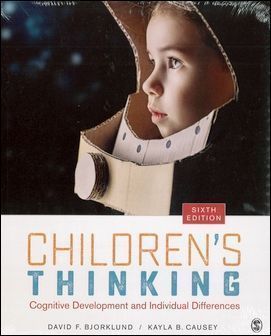Children's Thinking: Cognitive Development and Individual Differences 6/e
售價
$
1,550
- 一般書籍
- ISBN:9781506334356
- 作者:David F. Bjorklund, Kayla B. Causey
- 版次:6
- 年份:2017
- 出版商:SAGE Publications
- 頁數/規格:720頁
- 參考網頁:Children's Thinking: Cognitive Development and Individual Differences 6/e
書籍介紹
本書特色
目錄
作者介紹
Description
The Sixth Edition of the topically organized Children’s Thinking presents a current, comprehensive, and dynamic examination of cognitive development. The book covers individual children and their developmental journeys while also following the general paths of overall cognitive development in children. This unique and effective approach gives readers a holistic view of children’s cognitive development, acknowledging that while no two children are exactly alike, they tend to follow similar developmental patterns. Supported by the latest research studies and data, the Sixth Edition provides valuable insights for readers to better understand and work with children.
The Sixth Edition of the topically organized Children’s Thinking presents a current, comprehensive, and dynamic examination of cognitive development. The book covers individual children and their developmental journeys while also following the general paths of overall cognitive development in children. This unique and effective approach gives readers a holistic view of children’s cognitive development, acknowledging that while no two children are exactly alike, they tend to follow similar developmental patterns. Supported by the latest research studies and data, the Sixth Edition provides valuable insights for readers to better understand and work with children.
NEW ANO KEY FEATURES
- Contemporary themes in cognitive development are integrated throughout the text-including the neoconstructivist approach the Goldilocks effect, Bayesian probabilistic reasoning, "hot" and "cold" executive functioning, perceptual narrowing, and causal representation.
- Expanded discussion of sociocultural perspectives in key areas includes gender cognition, language, and the effects of media on the development of attention.
- Section Reviews throughout chapters have replaced end-of-chapter summaries to help readers review and retain the material more effectively.
- Ask Yourself… questions consecutively numbered within a chapter after each Section Review engage students in reflection and critical thinking.
Table of Contents
Chapter 1. Introduction to Cognitive Development
Chapter 2. Biological Bases of Cognitive Development
Chapter 3. Social Construction of Mind: Sociocultural Perspectives on Cognitive Development
Chapter 4. Infant Perception and Cognition
Chapter 5. Thinking in Symbols: Development of Representation
Chapter 6. Development of Folk Knowledge
Chapter 7. Learning to Think on Their Own: Executive Function, Strategies, and Problem Solving
Chapter 8. Memory Development
Chapter 9. Language Development
Chapter 10. Social Cognition
Chapter 11. Schooling and Cognitive Development
Chapter 12. Approaches to the Study of Intelligence
Chapter 13. Origins, Modification, and Stability of Intellectual Differences
Glossary
References
Index
Chapter 1. Introduction to Cognitive Development
Chapter 2. Biological Bases of Cognitive Development
Chapter 3. Social Construction of Mind: Sociocultural Perspectives on Cognitive Development
Chapter 4. Infant Perception and Cognition
Chapter 5. Thinking in Symbols: Development of Representation
Chapter 6. Development of Folk Knowledge
Chapter 7. Learning to Think on Their Own: Executive Function, Strategies, and Problem Solving
Chapter 8. Memory Development
Chapter 9. Language Development
Chapter 10. Social Cognition
Chapter 11. Schooling and Cognitive Development
Chapter 12. Approaches to the Study of Intelligence
Chapter 13. Origins, Modification, and Stability of Intellectual Differences
Glossary
References
Index
David F. Bjorklund - Florida Atlantic University, Boca Raton, Florida
Kayla B. Causey - California State University, Fullerton, USA
Kayla B. Causey - California State University, Fullerton, USA

